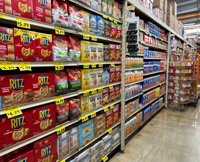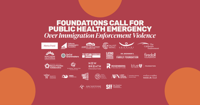
(Photo by Amairani Hernandez.)
Trust for America’s Health (TFAH), a nonprofit organization dedicated to public health research and policy, has released a new report titled “State of Obesity 2025: Better Policies for a Healthier America.” Analyzing 2024 data, the report found a first time decrease in states with adult obesity rates over 35% but warns that this progress is limited and at risk due to federal budget cuts and staffing reductions.
The report, based in part on TFAH’s analysis of newly released 2024 data from the Centers for Disease Control and Prevention’s Behavioral Risk Factor Surveillance System (BRFSS), and recent data from the 2021-2023 National Health and Nutrition Examination Survey (NHANES), shows that while the rise in the number of U.S. adults with obesity slowed in some states, the nation’s overall obesity rate continues to be alarmingly high.
Like the rest of the state, California has experienced an increase in obesity rates. Oftentimes, obesity is associated with various health risks, including some of the leading causes of death in the U.S., such as diabetes, heart disease, stroke and some types of cancer. In California statewide, 45% of the Latino population was obese, as compared with 25% of the White population.
“Structural barriers to healthy eating and physical activity need continued policy attention and investment,” said TFAH president and CEO Dr. Nadine Gracia.“It is vital that the government and other sectors invest in – not cut – proven programs that support good nutrition and physical activity and ensure they reach all communities.”
CALÓ News also spoke with Tekisha Everette, executive vice president for the organization. In her role, Everette focuses on supporting and advancing policies that promote and protect the health of all people in every community, working collaboratively with key organizations, policymakers and other partners to drive meaningful public health progress.
“In our recent report, we found some interesting findings related to an overall reduction in the adult rate of obesity that we're seeing. So it went from 41.9% to 40.3% for the national adult obesity rate. That's still an alarmingly high rate, but it is something that is interesting for us to find and we want to continue to explore this in future reports to see if we continue to see that downward trend,” Everett said. “We know that progress is in a fragile point because we are seeing several programs that help us prevent obesity facing some federal budget decreases and workforce cuts and not to mention the midst of a government shutdown, preventing us from being able to see those prevention programs be effective.”
Esteban Perez recently retired after working for many years as a mechanic and had just qualified for the Supplemental Nutrition Assistance Program (SNAP). However, due to the government shutdown, his benefits were cut off on November 1. Although the Trump administration has pledged to partially fund SNAP following a federal court order, it may take weeks or even months before those benefits are restored.
SNAP helps low-income families buy groceries so they can afford the healthy food they need to stay well. Perez struggles with several chronic diseases such as type 2 diabetes and liver disease so for him these benefits are crucial to maintain a healthy diet while also stabilizing his levels.
While federal budget cuts could undo recent progress, Everette said programs that promote healthy nutrition are especially important, particularly those focused on educating people about chronic diseases and prevention. “We know that obesity in the United States is a very complex and multi-factoral challenge that we need to face but we need to be looking at both the physical activity and nutrition portions,” she said.
“Better Policies for a Healthier America” also emphasizes that people in rural areas and many communities of color often face bigger challenges such as eating healthier, high food prices, limited access to fresh foods and fewer safe places to be active.
“People living in rural communities have higher rates of obesity than people living in metro areas. So when we talk about the intersection of people of color and rurality or rural communities, specifically we know that they face some of the most adverse situations and opportunities and have fewer opportunities to really address obesity,” Everette said. “Prevention programs that are targeted towards rural communities and racially segregated communities have become even more important. There are so many programs focused on prevention in which they target education and resources for the community.”
The report also includes policy recommendations for the administration, Congress and state governments to address the nation’s obesity crisis. One key proposal calls for the Food and Drug Administration (FDA) to require front-of-package nutrition labels to help consumers make more informed food choices.
“The research estimates that about 55% of calories that all Americans consume are from ultra-processed foods and we know that for a variety of reasons, ultra ultra-processed foods can be more affordable, available and attractive to resource constrained families. But we need to really think about the consumption of ultra-processed foods and its association to the risk of obesity and other adverse health effects,” she said. “There are efforts such as front of package labeling that help individuals with the level of consumption and purchase. It also helps understand what's the content in the food that we're buying, but at the same time, we need to look at more structural upstream opportunities to reduce the amount of foods we have in our food supply that are not healthy.
Everette believes this is an important time for individuals and organizations to learn from the report and take action, advocating for healthier structures in their communities and across the country.
To read the full health report, click here.











(0) comments
Welcome to the discussion.
Log In
Keep it Clean. Please avoid obscene, vulgar, lewd, racist or sexually-oriented language.
PLEASE TURN OFF YOUR CAPS LOCK.
Don't Threaten. Threats of harming another person will not be tolerated.
Be Truthful. Don't knowingly lie about anyone or anything.
Be Nice. No racism, sexism or any sort of -ism that is degrading to another person.
Be Proactive. Use the 'Report' link on each comment to let us know of abusive posts.
Share with Us. We'd love to hear eyewitness accounts, the history behind an article.